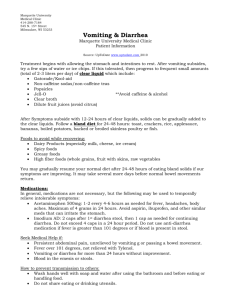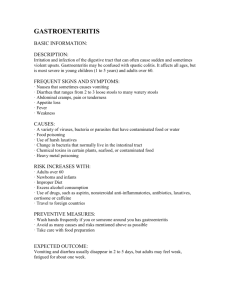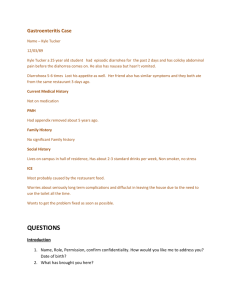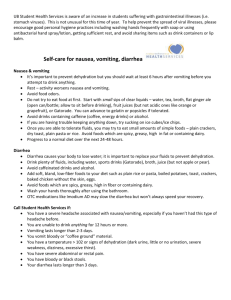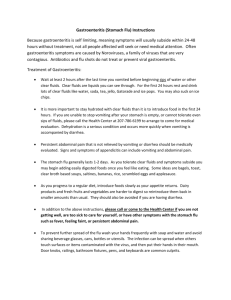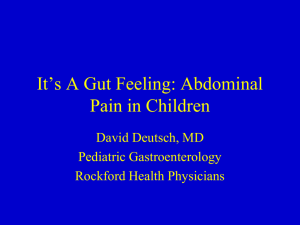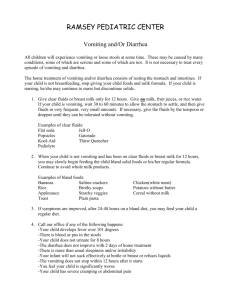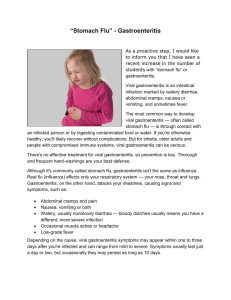UW-Stout Student Health Services Self Care Information: Vomiting and Diarrhea (Gastroenteritis)
advertisement
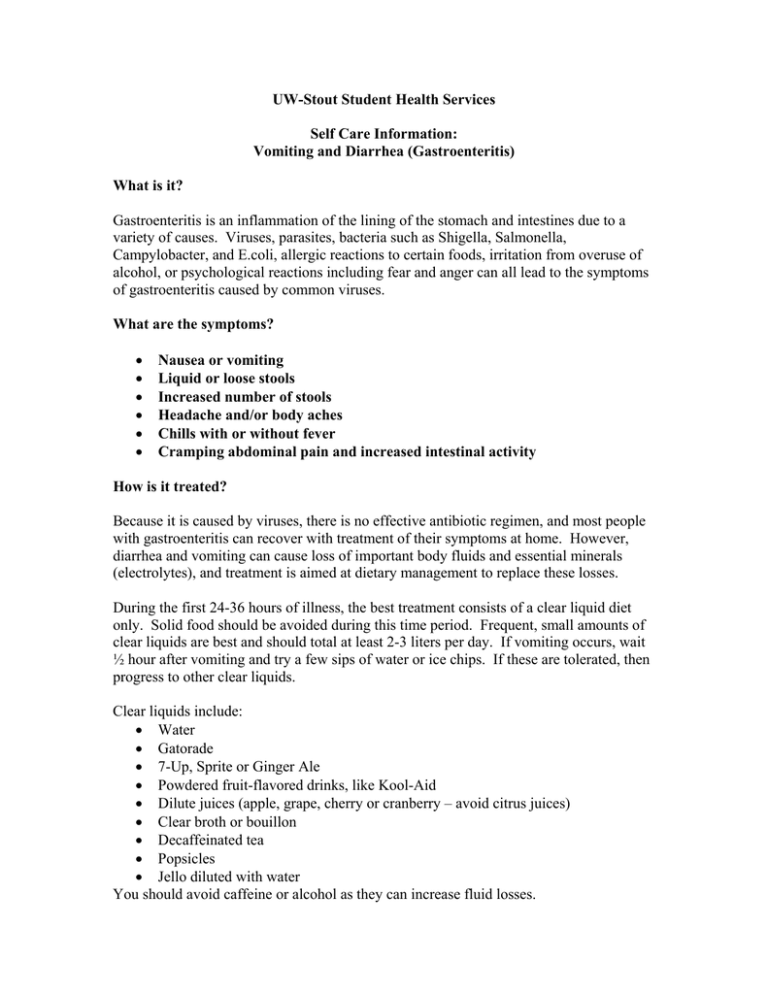
UW-Stout Student Health Services Self Care Information: Vomiting and Diarrhea (Gastroenteritis) What is it? Gastroenteritis is an inflammation of the lining of the stomach and intestines due to a variety of causes. Viruses, parasites, bacteria such as Shigella, Salmonella, Campylobacter, and E.coli, allergic reactions to certain foods, irritation from overuse of alcohol, or psychological reactions including fear and anger can all lead to the symptoms of gastroenteritis caused by common viruses. What are the symptoms? • • • • • • Nausea or vomiting Liquid or loose stools Increased number of stools Headache and/or body aches Chills with or without fever Cramping abdominal pain and increased intestinal activity How is it treated? Because it is caused by viruses, there is no effective antibiotic regimen, and most people with gastroenteritis can recover with treatment of their symptoms at home. However, diarrhea and vomiting can cause loss of important body fluids and essential minerals (electrolytes), and treatment is aimed at dietary management to replace these losses. During the first 24-36 hours of illness, the best treatment consists of a clear liquid diet only. Solid food should be avoided during this time period. Frequent, small amounts of clear liquids are best and should total at least 2-3 liters per day. If vomiting occurs, wait ½ hour after vomiting and try a few sips of water or ice chips. If these are tolerated, then progress to other clear liquids. Clear liquids include: • Water • Gatorade • 7-Up, Sprite or Ginger Ale • Powdered fruit-flavored drinks, like Kool-Aid • Dilute juices (apple, grape, cherry or cranberry – avoid citrus juices) • Clear broth or bouillon • Decaffeinated tea • Popsicles • Jello diluted with water You should avoid caffeine or alcohol as they can increase fluid losses. The US Centers for Disease Control and Prevention recommends a formula for selfmedication of diarrheal disease that will replace essential nutrients that are being lost. Prepare 2 separate glasses of the following and drink alternately from each glass. Glass #1: 8 oz. or fruit juice, ½ tsp. Honey or corn syrup, 1 pinch table salt. Glass #2: 8 oz. water, ½ tsp. baking soda. Suggested Medications: o Acetaminophen 325 mg every 4 hours may be taken to control fever, headaches and body aches. Aspirin and ibuprofen should be avoided because they may cause stomach irritation. o Emetrol may be used in the treatment of nausea and vomiting and is available without a prescription. o Bismuth sub-salicylate (Pepto-Bismol) 30-60 ml (2 T.) every 30 minutes for a total of 8 doses may be taken for diarrhea. Bowel movements will become black and tarry after Pepto Bismol use. OR o Imodium A-D 2 caplets or 4 tsp. after first bowel movement followed by 1 caplet or 2 tsps. After each subsequent bowel movement. Do not exceed 4 caplets or 8 tsp. in a 24-hour period. Note: Do not use anti-diarrheal medications if fever is greater than 101 degrees or if blood is present in the stool. These medications may be helpful in stopping diarrhea, but theoretically may cause more problems than they solve by retaining toxins and viruses inside the body rather than allowing their release. Starting Solid Foods: As nausea, vomiting, and diarrhea are controlled with use of a clear liquid diet for 24-36 hours, you should continue fluid intake, but may begin to add bland, constipating solids. To prevent a recurrence of symptoms, a bland diet should be taken for 24-48 hours before resuming a regular diet. Constipating solids include: • • • • • • • Toasted white bread with honey or clear jelly, avoid butter or margarine Soda crackers White rice (no butter); cream of wheat or rice cereal (no milk) Applesauce or bananas Boiled potatoes Baked or broiled fish or poultry without skin or fat Cultured dairy products, yogurt, cottage cheese, buttermilk Foods to Avoid: Because the digestive tract is inflamed with gastroenteritis, avoiding some foods that may exacerbate irritation is wise. These include: • • • • • Non-cultured dairy products (milk, cheese, ice cream) Spicy foods Greasy or fatty foods, including cream soups, beef or pork Alcohol or caffeine Foods containing roughage (whole grains, seeds and nuts, fruits with skins, raw vegetables) You may gradually resume your usual diet after 24-48 hours of eating bland solids of your symptoms are improving. It may take several more days before normal bowel movements return. When do I need medical attention? You should seek medical attention if you have: • • • • • Persistent abdominal pain, unrelieved by vomiting or passing a bowel movement. Fever over 101 degrees, not relieved with Tylenol use. Vomiting or diarrhea for more than 24hours without improvement or more than three times an hour. Blood in the vomit or stools. No urination for more than 8 hours. Prevention of Gastroenteritis: • • • • • Wash hands well with soap and water after using the bathroom and before eating or handling food. Do not share eating or drinking utensils. Avoid milk, meat, or egg-based foods (such as mayonnaise) that have been left unrefrigerated. During preparation of uncooked meat and poultry, thoroughly clean all utensils and work surfaces before use with other foods. When traveling in foreign countries, drink only bottled water or bottled drinks, eat only fruits and vegetables that can be peeled or have been thoroughly cooked, and avoid sidewalk food stands. SHS-Self Care Information (Gastroenteritis) 02/03
